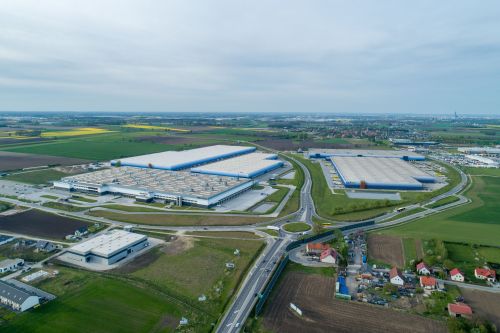Going up in the FTSE world
Investment & finance
The beginning of autumn was not a good time for the Polish economy – after a rise, the WIG index went south and the growth the country previously saw in wages, employment and industrial production slowed. However, this makes the fact that FTSE Russell has added Poland to its list of 25 developed countries in its annual review of world markets all the more noteworthy. The promotion was based on the strength of the Warsaw Stock Exchange, but it also generated a lot of publicity for other sectors of the economy. “The rapid development of Poland’s capital market has resulted in it being classed as a developed market. This is a fundamental change in how global investors perceive Poland. Our country’s reclassification gives us the opportunity to interest new investors in Polish shares and represents a great opportunity for the entire capital market,” effused Marek Dietl, the president of the WSE.
On a par with France and Japan
The FTSE reclassification might also be of benefit to the real estate market. “Poland’s promotion to the prestigious group of the world’s 25 most developed economies is long overdue. It highlights the country’s economic strength and opens it to new opportunities,” says Hadley Dean, the CEO of EPP. “I hope that FTSE Russell’s reclassification, placing the country shoulder to shoulder with major economies like the US, Germany, France, the UK, Japan and Australia, will help to underline the perception of Poland as both a dynamic and safe place for foreign investors’ money. When it comes to the long term effects of reclassification for the retail real estate market, it might be too soon to discuss them, but considering the numbers, the future is bright,” he adds.
Poland is the clear leader in the CEE region in every real estate sector and this can be clearly seen on the office market – at the end of H1 total stock was more than 10 mln sqm while a further 1.8 mln sqm was under construction. “Those companies that consider locating their projects to our country have a choice of eight well-developed regional cities as well as Warsaw. In this respect we can compete with Western European markets, such as Germany, the UK and France. Poland’s cities make up one of its main competitive advantages when attracting companies such as those from the banking and finance sectors and this is fuelling further growth in the demand for office markets in Poland’s nine largest cities,” claims Tomasz Trzósło, the managing director of JLL in Poland, who goes on to add that classifying Poland as a developed country increases its economic credibility in the eyes of investors. “This promotion could help the Polish real estate market indirectly, improving the overall perception of investment risk in the country. As a result, it might – although of course it doesn’t have to – increase global investors’ interest in the Polish market as well as raise its real estate prices,” he adds.

Jarosław Zagórski, the commercial and development director of Ghelamco Poland, feels that FTSE Russell’s decision may only have a limited effect
Wait for it... wait for it... wait
Most experts agree that being placed among this elite group of developed countries is good news but they are cautious when it comes to listing the immediate benefits. “The effects of Poland’s new classification will be positive but we will have to wait a bit to see any tangible benefits. The first of these will be the greater willingness of foreign banks, many of which have been absent from Poland so far, to start operating here. There have been signs on the market that many of these companies are now more interested in providing financing in Poland – including for real estate projects under construction. I would also expect foreign banks to start easing their criteria for financing development projects. This is good news because their interest rates are very competitive compared to those currently found on the market,” claims Maciej Drozd, the CFO of Echo Investment.
Jarosław Zagórski, the commercial and development director at Ghelamco Poland, is of the opinion that FTSE Russell's decision may affect real estate investment but does not necessarily have to. “The fact that Poland generally holds high positions in many different types of rankings and ratings definitely changes how people perceive the entire economy, including the real estate sector. However, you need to remember that those investment funds that buy real estate in Poland look at many different factors. Poland’s investment market has been attracting funds from around the world for many years. They know both our properties and also the conditions on the local market. I believe that a large proportion of these funds regard the quality of the buildings and their lease agreements to be of more importance. You also need to bear in mind that funds like peace and predictability. Right now it’s difficult to say how the taxation of real estate investment will change. And in my opinion, this uncertainty could have a much greater impact on investment levels in Poland than rankings or ratings,” he claims.
Opening up the global piggy bank
Of course, not all ratings agencies consider Poland to be a developed market. Morgan Stanley (MSCI) is one that does not, but FTSE Russell’s promotion of the Warsaw Stock Exchange could also result in one other change, which is perhaps the most important of them all. “The Warsaw Stock Exchange is now reaping the benefit of two companies – FTSE Russell and Stoxx – classifying Poland as a developed country, while according to another global rating agency – MSCI – we are still just a developing market. The majority of the world’s investment funds – around 87 pct – only invest their capital in the most developed countries. Up until now we have only had access to 12–13 pct of global investment capital but since September we have had access to all of it. Nevertheless, investment portfolios will need a few years to restructure as a result of the FTSE Russell decision,” commented Marek Dietl on the announcement by FTSE Russell.
What starts in the capital market is generally followed by other segments of the economy, including real estate. “The change begins with financing, because the FTSE Russell index, according to which we are now a developed country, tends to be followed by the banks. Investors often look more to the MSCI rating by Morgan Stanley. According to this, Poland is still a developing country. So I expect the capital market to react more slowly to Poland’s reclassification by the FTSE. In theory, classifying us as a developed market opens Poland up to investment from a certain type of fund, however, in order to promote ourselves as a place in which to invest capital, both time and hard work are needed to stabilise and improve the image of both the market and the companies that trade here. You have to remember that we used to be an important and stable country among those classified as developing markets, but now we have to fight to compete for the interest of investors with countries that have had strong well-established economies for many years,” says Maciej Drozd.
Poland may have reason to celebrate but the ratings change is only a single step down a long road and not the final destination. We certainly cannot rest on our laurels and need to focus even more on our shortcomings keeping in mind that joining this elite club only brings greater challenges. ν





















































